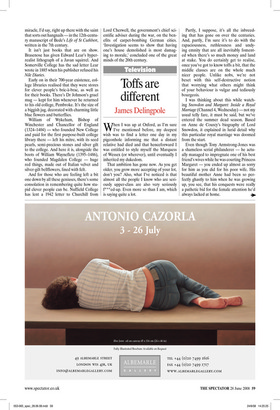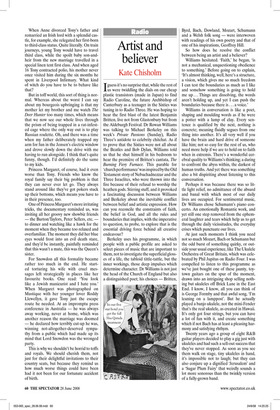Toffs are different
James Delingpole
When I was up at Oxford, as I’m sure I’ve mentioned before, my deepest wish was to find a letter one day in my pigeonhole informing me that a distant relative had died and that henceforward I was entitled to style myself the Marquess of Wessex (or wherever), until eventually I inherited my dukedom.
That ambition has gone now. As you get older, you grow more accepting of your lot, don’t you? Also, what I’ve noticed is that almost all the people I know who are seriously upper-class are also very seriously f***ed-up. Even more so than I am, which is saying quite a lot. Partly, I suppose, it’s all the inbreeding that has gone on over the centuries. And, partly, I’m sure it’s to do with the rapaciousness, ruthlessness and undying emnity that are all inevitably fomented when there’s so much money and land at stake. You do certainly get to realise, once you’ve got to know toffs a bit, that the middle classes are on the whole much nicer people. Unlike nobs, we’re not beset with this self-destructive notion that worrying what others might think of your behaviour is vulgar and tediously bourgeois.
I was thinking about this while watching Snowdon and Margaret: Inside a Royal Marriage (Channel 4, Wednesday) — not my usual telly fare, it must be said, but we’ve entered the summer dead season. Based on Anne de Courcy’s biography of Lord Snowdon, it explained in lurid detail why this particular royal marriage was doomed from the start.
Even though Tony Armstrong-Jones was a shameless serial philanderer — he actually managed to impregnate one of his best friend’s wives while he was courting Princess Margaret — you ended up almost as sorry for him as you did for his poor wife. His beautiful mother Anne had been so perfectly ghastly to him when he was growing up, you see, that his conquests were really a pathetic bid for the female attention he’d always lacked at home. When Anne divorced Tony’s father and remarried an Irish lord with a splendid castle, for example, she relegated her first-born to third-class status. Quite literally. On train journeys, young Tony would have to travel third class, while the spoilt baby son-andheir from the new marriage travelled in a special linen tent first class. And when aged 16 Tony contracted polio, his mother never once visited him during the six months he spent in Liverpool Infirmary. What kind of witch do you have to be to behave like that?
But in toff world, this sort of thing is normal. Whereas about the worst I can say about my bourgeois upbringing is that my mother let my brother and me watch The Deer Hunter too many times, which means that we now see our whole lives through the prism of being trapped in a rat-infested cage where the only way out is to play Russian roulette. Oh, and there was a time when my father deliberately trapped my arm for fun in the Jensen’s electric window and drove slowly down the drive with me having to run alongside. I think that’s quite funny, though. I’d definitely do the same to my kids.
Princess Margaret, of course, had it even worse than Tony. Friends who know the royal family say their big problem is that they can never ever let go. They always stand around like they’ve got pokers stuck up their bottoms, which means you have to in their presence, too.
One of Princess Margaret’s more irritating tricks, the documentary reminded us, was inviting all her groovy new showbiz friends — the Burton/Taylors, Peter Sellers, etc. — to dinner and watching like a hawk for the moment when they became too relaxed and overfamiliar. The moment they did her blue eyes would frost into an evil death stare, and they’d be instantly, painfully reminded that this wasn’t a mate, this was the Queen’s sister.
For Snowdon all this formality became rather too much in the end. He started torturing his wife with cruel messages left strategically in places like her favourite books. One read: ‘You look like a Jewish manicurist and I hate you.’ When Margaret was photographed on Mustique with her younger lover Roddy Llewellyn, it gave Tony just the escape route he needed. At an impromptu press conference in Australia — he was always away working, never at home, which was another reason the marriage was doomed — he declared how terribly cut-up he was, winning not-altogether-deserved sympathy from a public which had made up its mind that Lord Snowdon was the wronged party.
This is why we shouldn’t be horrid to toffs and royals. We should cherish them, not just for their delightful invitations to their country seats, but because they remind us how much worse things could have been had it not been for our fortunate accident of birth.



















































































 Previous page
Previous page